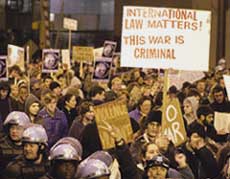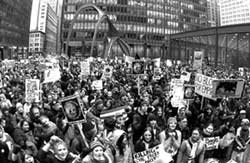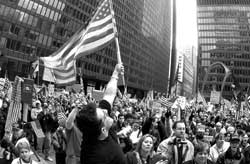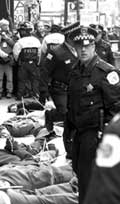
ATLANTA, Ga. (FinalCall.com)–Not since the Vietnam War has debate raged so high on the world scene as is now evident in the U.S.-led war against Iraq. President Bush’s decision to attack Iraq has amassed world opinion against the United States, with many capitals viewing America as an aggressive superpower that is willing to trash United Nations protocol in order to rid Iraq and the Middle East of President Saddam Hussein and weapons of mass destruction. Never in the history of U.S. presidents has the character and image of one been so maligned and vilified as that of President George W. Bush.
“An unnecessary war has begun, the United Nations has been undercut, the future of our children has been clouded by this new cycle of violence,” said Rev. Jesse Jackson Sr., head of the Chicago-based Rainbow/PUSH Coalition, a civil rights group.
Offering prayer for U.S. troops, Rev. Jackson noted that the Archbishop of Cantebury and the leaders of almost every major religion across the globe opposed a first strike.
“Nelson Mandela, the greatest moral voice of recent times, has spoken out against a unilateral, aggressive, pre-emptive strike,” Rev. Jackson said. “Our nation will have to live with the future consequences of this strike, not just next week, but for decades. Our moral authority has been weakened.”
The world raises its voice
Millions around the globe have led anti-war demonstrations since the Bush initiative for Iraq became clear. In New York City, demonstrators marched down Broadway Avenue; in Los Angeles they jammed Sunset Boulevard; in Chicago, protesters packed Lakeshore Drive, with similar scenes played out in Atlanta, Washington, D.C., San Francisco and other cities.
“Families are coming out, kids are coming out. In deference to that, we want to keep this a positive experience,” said Mario Santos, an organizer of the anti-war rally in San Francisco, where police arrested 10 of the thousands who marched on March 23 through the financial district. The New York protest drew some 500,000, according to organizers. In Washington, demonstrators doused themselves in red dye to symbolize the senseless shedding of blood and marched as close to the front of the White House as possible. Many protesters laid down in the streets to block traffic.
Supporters of the Iraq initiative met each of the demonstrations, according to published reports, with some expressing their strong backing of Mr. Bush’s goal of regime change and others saying they merely support the troops. Some waved signs that read, ‘’Freedom’s not free.”
More troubling signs came from overseas where some demonstrations resulted in deadly clashes.
In Yemen, three demonstrators reportedly were killed as more than 30,000 rushed the doors of the U. S. Embassy there.
Thousands of demonstrators trekked through the streets in Australia, Japan, Malaysia, India, Thailand, China and other countries across Asia voicing anti-war sentiments.
Sit-down protests outside the U.S. military’s European Command in Stuttgart, Germany, were held as authorities braced for new protests in predominantly Muslim countries, including Pakistan and Indonesia, whose president has condemned the war as a violation international law.
In Melbourne, Australia, about 5,000 protesters marched to the sound of mock air raid sirens, while thousands of Muslims in eastern Malaysia burned British and U.S. flags and effigies of the two countries’ leaders. Nearly 7,000 protesters filled a busy road in Kota Baharu City as police stood guard.

“What makes this country great is the freedom to express,” said newly elected Democratic Congressman David Scott of Georgia. “Nowhere else in the world could you do that. So, you can’t condemn their (protestors) expression of how they feel. But I do hope that as the protestors are doing what they do, understand that we don’t want to give the wrong signals to what is happening over there in the Middle East. We are a target. We have been attacked. We have to look at this from the perspective of the fact that we didn’t ask for this, it was brought to us. We are the good guys, they are the bad guys and they have weapons of mass destruction,” he said.
Perhaps fueling the outrage and the street demonstrations is the round-the-clock, blow-by-blow television coverage of the war effort resulting from unprecedented access to U.S. journalists. Some have even suggested that the access to journalists was provided because of U.S. expectations of a short war and a desire to show the world the “shock and awe” of U.S. military might.
But it is a strategy that could backfire, should the war be drawn out and U.S. casualties begin to mount, according to observers.

“Can you imagine being a mother who believes that everything is okay with your son or daughter in the most powerful army in the world, only to find out via television that he or she is now a prisoner of war?” asked Chris Askew, radio talk show host at WAOK-AM, Atlanta, Ga. “Everyday, our listeners call in and the number one concern of theirs has been the accuracy in media reporting. My concern is that the information presented to us as a Black community or people in general should be researched and verified. Just believing solely based on what you hear is a big problem.”
Propaganda war
In any war, it is said, the first casualty is the truth. And so far, depending on which networks one watches for news will be the perception they get on how the war is going.
For example, Israelis talk of great and rapid advances with only “pockets of resistance,” a reflection of war seen through the eyes of CNN and the BBC. Palestinians talk of Iraqis putting up a tough fight that the British and the Americans, and most others around the world, had not expected to see.
Newspapers in East Jerusalem and Ramallah do not lead with how many miles the “coalition forces” have traveled into Baghdad, but rather with news such as the severe civilian casualties in Basra, Iraq.
Though it can be argued that both sides are playing out propaganda wars in order to gain the upper hand in world opinion, political analysts contend this strategy is not one that would necessarily benefit Iraq.
“Iraq is not in a position, actually, to manage a propaganda war, primarily because the infrastructure there is crumbling so fast,” said Washington, D.C.-based political analyst Ron Walters. “In a day or so, they won’t be able to do anything. Right now, what’s going on (is that) elements of the propaganda war are being run outside of Iraq.”
Mr. Walters told The Final Call that the availability of Al Jazeerah, the Qatar-based news agency, represents the newest element in the reporting of occurrences. He said the UN has been noticeably quiet in its monitoring of war events, even in the expected vocal criticism of America for going to war without UN Security Council agreement. The source of real, on the ground reporting, he said, interestingly is coming from Al Jazeerah.
“There is a propaganda war going on in this country to which the media is a party, because of the so-called ‘embedded’ posture of the media in the war. We see a lot of generals around these tables. What we don’t see is any objective take. The interesting thing to me is that the media has become part of the American propaganda machine. I think that is the most powerful element right now,” he said.
Next target?
The way the war against Iraq shapes up in terms of resistance, duration and casualties could determine how the United States would deal with any other possible Middle East conflict in the future, say Arab analysts, expressing the unspoken fear of many states in the region.
“There is little doubt that the U.S.-led forces will ultimately win this war. But the way the victory is achieved will have a lesson for the future,” said Ahmed Khafafi of the Dar Al Khaleej Research Center.
From a humanitarian viewpoint, a longer war and high death toll is not an ideal prescription, the researcher said. “Strategically, however, Arab interests are better served and protected by stiff Iraqi resistance and an extended war, which is bound to result in a high death toll.”
Explaining his hypothesis, Mr. Khafafi said: “U.S. approached the Iraq crisis with a picture in mind of what it achieved in Afghanistan following September 11, 2001 attacks.”
It was an immensely successful military campaign, he said. If the same were to be repeated in Iraq or if the United States achieves its objectives with just marginally better resistance, Washington’s eyes will be set on Iran and Syria very soon, he added.
“The American policy now is one of ‘might is right’ and that is ominous for the region. At this point in time, the only voice that Washington will heed to is its public opinion–and that will change from being pro-war to anti-war only if there is a high casualty rate–both Iraqi and American,” he said.
But U.S. objectives hit a roadblock, at Final Call press time. Stiff resistance from Iraqi forces in some urban centers forced a change of plan, according to Gen. Tommy Franks, head of the U.S. Central Command who is leading the forces into battle.
Gen. Franks is electing to bypass some Iraqi forces and not occupy key cities on the way to Baghdad, raising questions about leaving behind dangerous enemy fighters and chaos in urban areas in the wake of his advancing troops.
Military analysts said that Gen. Franks might be taking unnecessary risks in the strategy he is employing, including stretching supply lines, allowing concentrations of enemy forces in the rear of his advancing troops, and using an invasion force that simply may be too small for the task at hand, according to a report by the Associated Press.
“The force is so light that it probably has the lowest ratio to enemy forces of any major ground campaign we’ve fielded in the last century,” said military analyst Loren Thompson of the Lexington Institute think tank in Virginia.
In essence the United States is attacking a dozen Iraqi divisions with two divisions of its own, he told the AP.
Gen. Franks, during a March 24 briefing in Qatar, said invading U.S. troops intentionally bypassed enemy formations,” including paramilitary forces, in southern Iraq.
Iraqi forces in the rear of the advancing U.S. troops have already drawn blood.
For example, an Army supply convoy that apparently took a wrong turn near the southern city of Nassiriya on March 23 was ambushed by irregular Iraqi forces, leaving U.S. soldiers dead or missing.
“We’re watching the flanks with the full realization that we are stretched out somewhat,” retired U.S. Rear Adm. Stephen Baker of the Center for Defense Information in Washington, who played a key role on an aircraft carrier battle group in the 1991 Gulf War, told the AP. “The vulnerability of supply lines has been looked at with extreme intensity.”
Another consequence of electing not to occupy cities and towns left in the rear of the advancing army is the possibility of civil unrest, looting and strife in those areas.
Ultimate goal of war
For former Illinois Congressman Gus Savage, who was the leading voice against the disproportioned military aid to Israel and was the leading voice on the floor in Congress against the 1991 U.S. invasion of Iraq, the Bush-ordered invasion in 2003 parallels greatly to that of 1991.
George Bush, the father, also convened a special session of Congress by declaring the invasion during the government’s Christmas break, he said. So by the time Congress reconvened, the troops were already committed in the Gulf.
“If America truly wants peace, she must yield to the demands for justice. She must fundamentally fight for justice. This war is not a fight for justice. This is a war waged by neo-colonialist powers, led by the United States against Iraq, to maintain an unfair exploitation of the resources from one sector of the world for their own advantage,” he told The Final Call from his Washington home.
 Asked about the lack of participation by Blacks at anti-war rallies, Mr. Savage said: “The issue is broader than the mere question of peace or war as generally framed by the current peace movement. It is about fundamental justice–and until you recognize the injustices done against Blacks and work to address those issues at home, you will find less participation of us in the rallies and protests because you would have proven that racism still exists. No justice, no peace is not just a cliché. It is a fundamental principle that can only be ignored but for so long.”
Asked about the lack of participation by Blacks at anti-war rallies, Mr. Savage said: “The issue is broader than the mere question of peace or war as generally framed by the current peace movement. It is about fundamental justice–and until you recognize the injustices done against Blacks and work to address those issues at home, you will find less participation of us in the rallies and protests because you would have proven that racism still exists. No justice, no peace is not just a cliché. It is a fundamental principle that can only be ignored but for so long.”
For presidential candidate Rev. Al Sharpton and Los Angeles activist Earl Ofari Hutchinson, the domestic issues are what’s pushing the war agenda.
Rev. Sharpton told a meeting of the Association of Community Organizations for Reform Now, or ACORN, that instead of spending billions on the war, Pres. Bush should focus on funding education, housing and prescription drugs for military families and other low-income Americans.
“Don’t be too cowardly to speak out now,” he admonished other Democratic presidential hopefuls. “If you can’t open your mouth now, you don’t deserve to run for president. Don’t love the troops when they are in uniform overseas and not love them when they are in blue jeans at home.”
“The war is dividing the country, almost hopelessly dividing the country,” said Mr. Hutchinson. “People are looking at the Bush administration and asking the question, why are we in this war? What benefit is it going to have to this country, and how is this war going to do anything to further education, healthcare, and social services, job development and protection, environmental issues?
“The fact is, you’ve got literally billions of dollars that are being drained from education, health care, social service programs, to fight an unnecessary and unjust war. And the fact that so many people, millions, are in the streets expressing their outrage about that injustice tells me that Bush has, more than any other president in recent times, deeply divided the country and has sewn probably for years to come deep distrust over the political process,” he said.
(The Inter Press News Service contributed to this report.)












